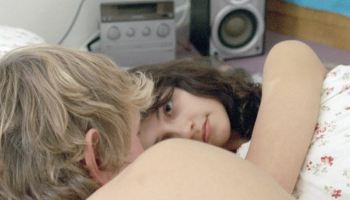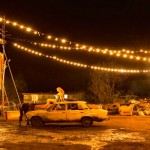By Eleonora Mignoli
Directed by Franz Mí¼ller
A correct subtitle for this movie could be “Anatomy of a Love Story”. The film is about two very different people, Robert (í€lex Brendemí¼hl) and Maren (Marie-Lou Sellem), who meet through a chat room and begin to see each other and then surrender to the desire of having a family and move in together. Both are single parents and their children, teenagers Mira and Daniel, find themselves living under the same roof. As Robert say s in the movie, “the apple doesn’t fall far from the tree” and soon Mira and Daniel fall in love as well.
The best quality of Wallace Line is its succinct storytelling. The 84 minutes of the film cover a span of about two years in the life of their characters. Nothing however feels missing: all the little moments that make a love story are there. The director starts from the presupposition that love is a universal language and that its rhythms, ups and downs are well known. With a couple of brush strokes Franz Mí¼ller is able to paint three-dimensional protagonists and each scene is functional in moving the story forward.

Its strength lies in its storytelling. There are stories that excite us for the duration of its run time, that let us walk out of the movie theatre moved and galvanized but that are soon forgotten; then there are the ones that stay with us longer, that pop into our minds weeks or even moths later in the least expected circumstances. Wallace Line is part of the second group. It has stayed with me, like a picture on the top shelf. Maybe because it’s so close to life, its characters seem to have really lived and loved.
Another interesting aspect is the depiction of each gender’s relationship with love. Neither Maren nor Robert are victims of their roles as man and woman, father and mother, husband and wife. While both partly fulfil their gender expectations (he’s a self-made landscape designer, she’s a refined librarian) they are not entrapped by the stereotype. Robert is the more family-inclined, still nursing a deep longing for his late wife, Maren is independent to a fault, having chosen to raise a daughter whose father she didn’t love. Mira and Daniel are mirror images of their parents, teenagers who have already learnt to behave like adults and that see clearly the cracks forming in Maren and Robert’s relationship. Again they refuse gender stereotyping with Mira being the more resourceful and strong while Daniel is meek and sensible and the true romantic of the couple.
The Wallace Line is not a film without its faults. The happy ending, with Maren and Robert meeting again after a long breakup, forces the hand of what was an otherwise perfectly life-like depiction of a love story. It’s interesting to reflect upon the original title (Die Liebe Der Kinder which means The Love of Children) and its English translation (The Wallace Line). The first seems to focus on the romantic component of the movie, either telling us that the important thing is the new love of Mira and Daniel or that Maren and Rober’s love is innocent and has a childlike quality. The international title draws instead from Maren’s work on Alfred Russel Wallace, the nineteenth-century evolutionist whose theories were obscured by Charles Darwin. This second interpretation seems to present a colder point of view, where the mistakes of the parents doom the happiness of the children. The truth lies in the eye of the beholder.
Watch “˜The Wallace Line’ at FilmDoo now (UK & Ireland only)





